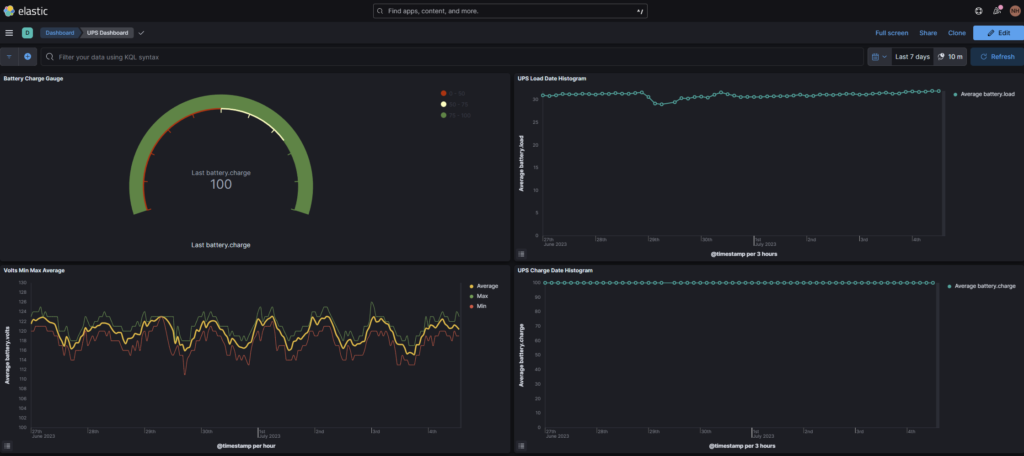Many years ago, I wrote a blog post about monitoring my UPS with Splunk. Since then, I’ve moved away from Splunk to the Elastic stack. Fortunately, moving that monitoring over was pretty much a breeze.
The information is still coming from upslog, which is bundled in with nut. FIrst, I configured nut to define the UPS and the connectivity, in this case a USB connection. Then, I had to modify the upslog.service file to get it to start and monitor the correct UPS device, then output it to /var/log/ups.log. Honestly, that was the hardest part of the configuration. From here, it was a breeze.
Once upslog was outputting data to the log file, I simply created a logstash config to read it:
input {
file {
path => "/var/log/ups.log"
tags => [ "ups" ]
}
}Then, this grok filter parses out all the appropriate fields:
filter {
...
else if "ups" in [tags] {
grok {
match => {
message => [ "^%{DATA:rawdate} %{DATA:rawtime} %{INT:battery.charge} %{NUMBER:battery.volts:float} %{INT:battery.load} \[%{DATA:battery.status}\] %{GREEDYDATA}$" ]
}
add_tag => [ "ups_parsed" ]
}
mutate {
copy => {
"message" => "log.original"
}
rename => {
"host" => "host.hostname"
"path" => "file.name"
}
}
}
}This is directed into a datastream in Elastic:
output {
...
else if "ups" in [tags] {
elasticsearch {
hosts => [ "192.168.2.12:9200" ]
index => "logstash-ups"
manage_template => false
user => logstash_writer
password => xxxxxxxxxxxxxxxx
action => "create"
}
}
}I’m a big fan of the Elastic Common Schema (ECS), and I’ve extended it where necessary, such as this mapping for the UPS battery fields:
{
"_meta": {
"version": "1.5.0"
},
"date_detection": false,
"dynamic_templates": [
{
"strings_as_keyword": {
"mapping": {
"ignore_above": 1024,
"type": "keyword"
},
"match_mapping_type": "string"
}
}
],
"properties": {
"@timestamp": {
"type": "date"
},
"battery": {
"type": "object",
"properties": {
"charge": {
"type": "integer"
},
"load": {
"type": "integer"
},
"status": {
"type": "keyword"
},
"volts": {
"type": "float"
}
}
}
}
}Putting all of that together, I get parsed, well-formatted data that allows me to monitor my UPS on a custom dashboard:

